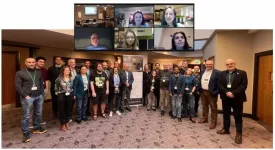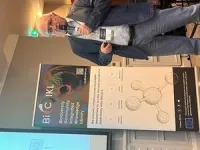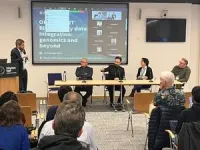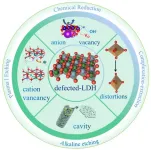(Press-News.org) The city of Cambridge and the Wellcome Campus hosted the Final General Assembly of the EU-funded project BiCIKL (acronym for Biodiversity Community Integrated Knowledge Library): a 36-month endeavour that saw 14 member institutions and 15 research infrastructures representing diverse actors from the biodiversity data realm come together to improve bi-directional links between different platforms, standards, formats and scientific fields. Consortium members who could not attend the meeting in Cambridge joined the meeting remotely.
The 3-day meeting was organised by local hosts European Molecular Biology Laboratory (EMBL) and ELIXIR in collaboration with Pensoft Publishers.
After a welcome cocktail reception on Monday evening at Hilton Cambridge City Centre, on Tuesday, the consortium made an early start with a recap of BiCIKL’s key milestones and outputs from the last three years. All Work Package leaders had their own timeslot to discuss the results of their collaborations.
They all agreed that the Biodiversity Knowledge Hub - the one-stop portal for understanding the complex - yet increasingly interconnected landscape of biodiversity research infrastructures - is likely the flagship outcome of BiCIKL.
In the afternoon, the participants focused on the services developed under BiCIKL. Amongst the many services resulting from the project some were not originally planned. Rather those were the ‘natural’ products of the dialogue and collaboration that flourished within the consortium throughout the project. “A symptom of passion,” said Prof. Lyubomir Penev, project coordinator of BiCIKL and founder/CEO of Pensoft Publishers.
An excellent example of one such service is what the partners call the “Biodiversity PMC”, which brings together biodiversity literature from thousands of scholarly journals and over 500,000 taxonomic treatments, in addition to the biomedical content available from NIH’s PubMed Central, into the SIB Literature Services (SIBiLS) database. What’s more, users at SIBiLS - be it human or AI - can now use advanced text- and data-mining tools, including AI-powered factoid question-answering capacities, to query all this full-text indexed content and seek out, for example, species traits and biotic interactions. about the “Biodiversity PMC” in its recent official announcement.
Far from being the only one, the “Biodiversity PMC” is in good company: from the blockchain-based technology of LifeBlock to the curation of the DNA sequences by PlutoF, the BiCIKL project consortium takes pride in having developed twelve services dedicated to FAIR and linked ready-to-use biodiversity data.
All those services are already listed in the FAIR Data Place within the Biodiversity Knowledge Hub, where each is presented with its own video. For many services, from the same page, visitors can also download factsheets meant to serve as user guidelines. All will also be featured in the EOSC catalogue.
All services developed under BiCIKL with links to their explanatory videos:
SynoSpecies by Plazi
The Biodiversity Literature Deposit by Zenodo: https://youtu.be/3grDK2Rh3Ps
The Treatment Bank by PlaziSiBiLS SPARQL Endpoint by SiBiLS
LifeBlock by LifeWatch ERICBiodiversity PMC by SiBiLSNanopublications for Biodiversity by Knowledge Pixels and PensoftOpenBiodiv by PensoftCuration of DNA sequences by PlutoFBiotXplorer, the biotic browser
ARPHA Writing Tool 2.0 by Pensoft
On Wednesday, the consortium focused on BiCIKL's activities from the Transnational and Virtual Access Pillar, which included both presentations by each open call leader and VA leader, as well as open discussions and a recap of what the teams have learnt from these experiences.
Thursday was dedicated to an open event where BiCIKL partners and ELIXIR Biodiversity and Plant Communities came together to discuss the Future of Biodiversity and Genomics data integration at the EMBL Wellcome Genome Campus. You can find the agenda on BiCIKL's website.
After 36 months of action, the BiCIKL project will officially end in April 2024, but does it mean that all will be done and dusted come May 2024? Certainly not, point out the partners.
To ensure that the Biodiversity Knowledge Hub will not only continue to exist but will not cease to grow in both use and participation, the one-stop portal will remain under the maintenance of LifeWatch ERIC.
In conclusion, we could say that an appropriate payoff for the project is “Stick together!” as put by BiCIKL’s Joint Research Activity Leader Dr. Quentin Groom.
***
You can find highlights from the BiCIKL General Assembly meeting on X via the #BiCIKL_H2020 hashtag (in association with #Cambridge and #finalGA)
***
All BiCIKL project partners:
Pensoft Publishers, Bulgaria
Naturalis Biodiversity Center, Netherlands
Plazi, Switzerland
Meise Botanic Garden, Belgium
European Molecular Biology Laboratory and Elixir/EMBL-EBI, Germany
European Organization for Nuclear Research, Switzerland
Consortium of European Taxonomic Facilities (Belgium) and Muséum national d’Histoire naturelle (MNHN, France, associated party to CETAF)
Institut Suisse de bioinformatique (SIB), Switzerland
Tartu Ülikool (UTartu), Estonia
E-Science European Infrastructure for Biodiversity and Ecosystem Research (LifeWatch), Spain
Freie Universitaet Berlin (FUB-BGBM), Germany
Global Biodiversity Information Facility (GBIF), Denmark
SPECIES 2000 (sp2000) and The Catalogue of Life (COL), United Kingdom
Taxonomic Databases Working Group, today’s Biodiversity Information Standards (TDWG), Netherlands END
EU-funded Biodiversity Community Integrated Knowledge Library (BiCIKL) project sums up outcomes and future prospects at a Final GA in Cambridge
2024-02-29
ELSE PRESS RELEASES FROM THIS DATE:
Detailed study demonstrates how pulse oximeters significantly overestimate oxygen readings in people with darker skin tones
2024-02-29
Pulse oximeters – one of the most common medical devices used in global healthcare – can provide significantly overestimated oxygen saturation readings in people with darker skin tones, according to the most comprehensive study ever to explore the issue.
Published in the British Journal of Anaesthesia, the new study is based on a systematic review of previous research into the use of the devices, and examined 44 studies dating from the mid-1970s to the present day.
In the course of that, researchers assessed more than 733,000 oxygen saturation readings taken from over 222,000 people – including almost ...
Virtual walking by synthesizing avatars into a 360-degree video
2024-02-29
Overview:
Researchers at the Toyohashi University of Technology and the University of Tokyo developed a system that provides a virtual walking experience to a seated person by real-time synthesis of a walking avatar and its shadow on a 360-degree video with vibrations to the feet. The shadow of the avatar induces an illusory presence of their body. In the future, it is expected to provide an immersive experience for any recorded medium with a virtual embodiment.
Details:
Walking is a fundamental activity for humans ...
How to make difficult-to-cut materials and components “easy-to-cut”?
2024-02-29
Difficult-to-cut materials such as titanium alloys, high-temperature alloys, metal/ceramic/polymer-matrix composites, hard and brittle materials, as well as geometrically complex components such as thin-walled structures, micro channels and complex surfaces, are widely used in aerospace community. Nevertheless, many problems including severe and rapid tool wear, low machining efficiency, and poor surface integrity exist in mechanical machining. How to efficiently and precisely process these materials and components, i.e., make difficult-to-cut ...
Defects engineering of layered double hydroxide-based electrocatalyst for water splitting
2024-02-29
In the context of the gradual depletion of fossil fuels and the energy crisis, hydrogen energy has attracted widespread attention due to its ultra-high energy density and eco-friendly properties. However, most of the hydrogen production still relies on fossil fuels, with less than 1 million tonnes produced as low-emission hydrogen in 2021, which means it has limited benefits in mitigating the energy crisis and environmental degradation. Alternatively, hydrogen production via water electrolysis has the advantages ...
International symposium to converge food-energy-water research for net zero development scheduled for March
2024-02-29
Researchers with the University of Tennessee, Knoxville, and Oak Ridge National Laboratory are hosting an international symposium focused on efforts to make urban and rural communities healthy and resilient to changes in climate, demographics, natural resources and ecosystems.
The “Food-Energy-Water Bioeconomies for Net-Zero Transition” international conference will be March 18-20 in Knoxville. The interdisciplinary conference is sponsored through a U.S. National Science Foundation grant awarded to a team led by Jie ...
Walking, reminiscing benefit brain health in older Black adults
2024-02-29
An innovative Oregon Health & Science University research program that enlists older Black adults to walk through and reminisce about historically Black neighborhoods in Portland — which now look very different after rapid change through gentrification — may help improve cognitive function, a new study finds.
The OHSU project has gained wide interest since its 2016 launch, with similar versions beginning to take root in Seattle and Oakland, California.
Now, newly published research suggests it may improve brain health in a population that’s disproportionately affected by Alzheimer’s disease. The study, published online ...
Uncovering the connections between autism, sensory hypersensitivity
2024-02-29
Supported by a $2 million R01 grant from the National Institutes of Health, the Auerbach Lab at the Beckman Institute for Advanced Science and Technology will examine how different genes associated with autism spectrum disorders may similarly impact our brain’s neurons, resulting in heightened sensitivity to sounds.
Autism spectrum disorders are genetically complex, and hundreds of genes are implicated in their development. As a result, some may conclude that autism is a collection of disconnected disorders with comparable symptoms. However, much like how roads converge as they approach a destination, at some level of brain function ...
Medical University of South Carolina neuroscientist honored for trailblazing pain management research
2024-02-29
Medical University of South Carolina neuroscientist Bashar Badran, Ph.D., was one of only 10 investigators nationwide recognized for their research at the fifth annual scientific meeting of the National Institutes of Health – Helping to End Addiction Long-Term (NIH HEAL) Initiative in Bethesda, Maryland. Badran received an honorable mention for the NIH HEAL Initiative Trailblazer Award.
The NIH HEAL Initiative provides funding to encourage scientific research into opioid use and pain management to fast-track progress in the face of the country’s current opioid epidemic. Its Trailblazer ...
Researchers decipher mysterious growth habit of weeping peach trees
2024-02-29
A basic premise of how plants grow is that shoots grow up and roots grow down. A new study, published in Plant Physiology, a leading international society journal published by the American Society of Plant Biologists, reveals the answer to a fascinating question: why do weeping tree varieties defy this natural growth pattern?
Researchers identified a protein called WEEP that is missing from the Weeping Peach Tree. Their results show how a DNA deletion in just one gene completely changes the localization of the hormone auxin, which ...
New study links hospital privatisation to worse patient care
2024-02-29
A new review has concluded that hospitals that are privatised typically deliver worse quality care after converting from public ownership. The study, led by University of Oxford researchers, has been published today in The Lancet Public Health (video summary available in the notes section)..
Lead author Dr Benjamin Goodair, postdoctoral researcher at the Department of Social Policy and Intervention at the University of Oxford, said: ‘This review challenges the justifications for healthcare privatisation and concludes that the scientific support for healthcare privatisation ...






